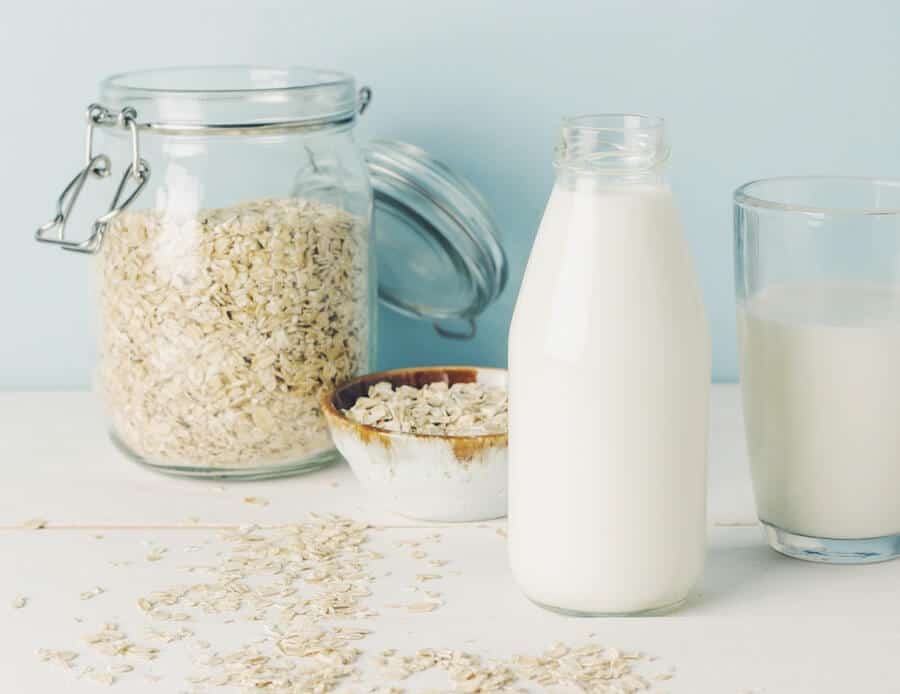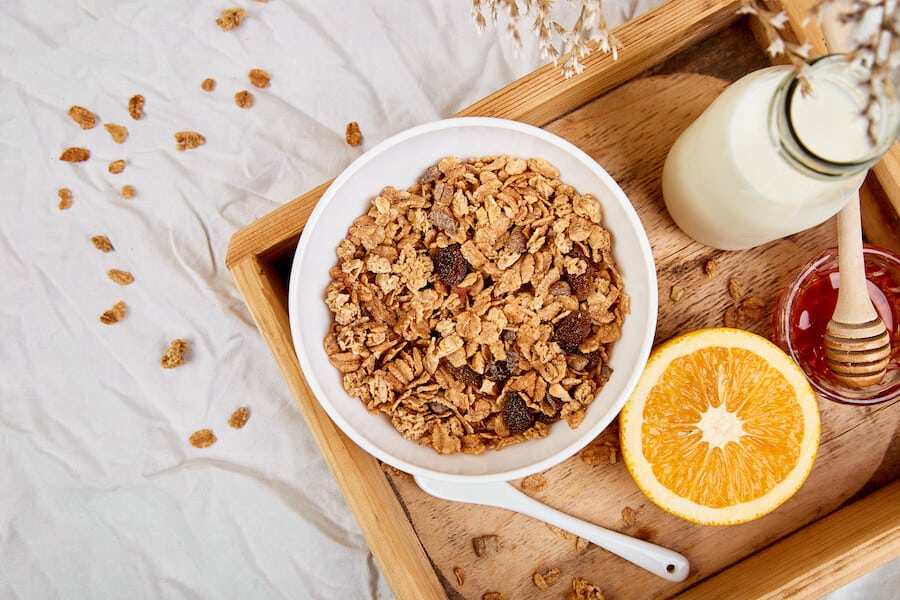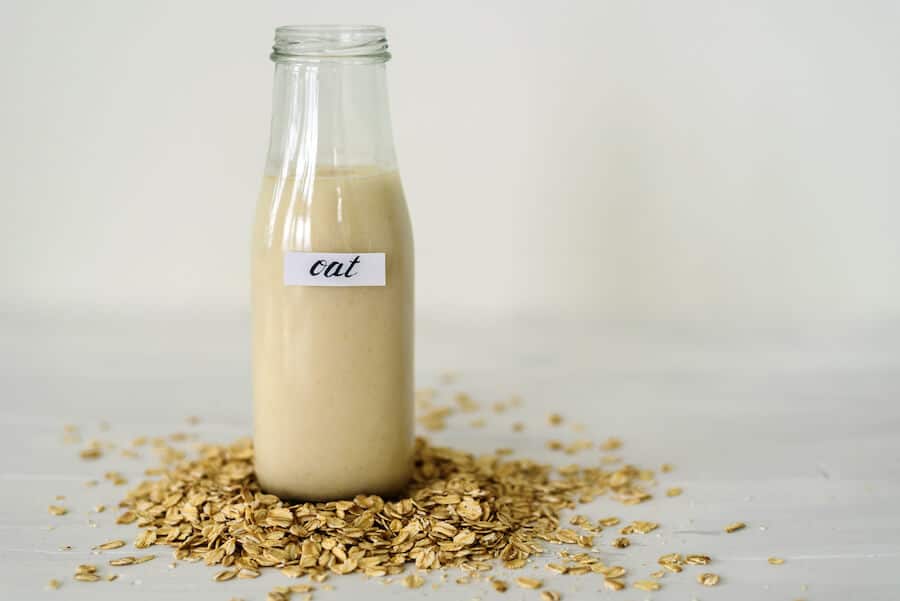Oat milk is the new rage in the dairy-free beverage industry. Some say it will soon replace almond milk as the #1 plant-based milk for its numerous health benefits and versatility. But is oat milk really all it’s cracked up to be? Here, we look at this trendy beverage’s pros and cons.
Pros
- Health Benefits
- Environmental Benefits (Sustainable)
- Versatility
- Soy, Nut & Dairy Free
Cons
- Added sugars
- Added Oils, Stabilizers, And Gums
- More Calories & Carbs
- Less Protein Compared To Dairy Milk
- Not Always Gluten-Free
Oat milk is increasing in popularity, but is it the right choice for you? Here are the pros and cons to help you decide.

Nutritional Benefits
Oat milk may be the better choice for non-dairy milk if you’re looking for more nutritional value. It has about 2 grams of fiber and 3 grams of protein per cup, compared to other non-dairy options like almond or rice milks which only offer around 1g of protein and fiber each! However, oat milk is a little heavy on the calorie and carb side, with about 120 calories per serving and 16 grams of carbs.
Fiber
Fiber is an essential part of a healthy lifestyle. It can help you slim down and feel more full, which in turn helps with weight loss– according to 2015 research published in Annals Internal Medicine, consuming more daily fiber may help increase weight loss. Fiber helps us feel fuller longer and improves our appetite control. Drinking oat milk or eating an oat snack between meals may help you reach your weight loss goals!
Calcium
If you are looking for a way to strengthen your bones, calcium is an essential nutrient. Fortified oat milk provides large amounts of this critical mineral which keeps teeth and bones strong and healthy! Calcium plays many vital roles in our bodies, from blood-clotting abilities all the way down to bone development – it may even lower risk factors related to osteoporosis when consumed at adequate doses by adults who do not drink cow’s milk regularly due to diet restrictions.
Phosphorus
The body needs phosphorus to use calcium to make your teeth and bones strong, helps your nerves and muscles function, and help your body produce energy. It’s found in many foods and is high in grains like oats! One cup (48 grams) may contain up to 20% of an adult’s daily value – so be sure you’re getting enough!
Riboflavin (B2) and B12
Riboflavin (also called B2) is an essential nutrient that helps cells grow, develop and function correctly while also helping turn food into energy! One cup of oat milk provides 45% of your daily value – so enjoy it with every meal if you want optimal health benefits like increased immunity or better skin tone.
Riboflavin is often found with B12 and other viatimes. Not only can the B12 in oat milk help your skin, but also your hair and nails! If you have a B12 deficiency, some symptoms you might experience are acne and dry, brittle nails. (study)
Weight Loss
Unsweetened oat milk is an excellent option for those trying to lose weight because it contains half the calories, a quarter of the fat, and less sugar than whole dairy products.
Unsweetened oat milk offers just 60 calories per cup, while skimmed milk has 90 calories per cup. So if you are on a calorie-conscious diet, oat milk may be the right choice!
As mentioned above, the high amount of fiber in oats will help make you feel fuller longer, which reduces cravings and will help you stick to your diet when trying to lose weight.
Environmental Benefits
Plant milks are not only gaining popularity because of dietary restrictions and the health benefits, but many of them are also more environmentally friendly than dairy milk. Oat milk is considered one of the most environmentally friendly milks on the market. Not only does it have a much smaller carbon footprint than dairy milk, but it is also easier on the environment than soy and almond milk!

Versatility
The demand for oat milk in coffee shops has skyrocketed in America, causing some chains to temporarily take it off the menu until they could restock. Oat milk works so well in coffee because of its complementary flavor and consistency, which is the most like cow’s milk. It froths and steams very well, and oat milk brands are making it even easier by producing special barista oat milks that are also available in stores.
There is also a wide range of varieties of oat milk, like full-fat, extra creamy, unsweetened, and protein-enriched oat milk. The available flavors, like chocolate, vanilla, maple, and pumpkin spice, make it an extra unique addition to any drink or baked good!
Soy, Nut & Dairy Free
If you have allergies or sensitivities to dairy, nuts, or soy, oat milk is a great alternative. Oat milk is made from oats that have been soaked in water and then ground into a creamy liquid. So it is nut-free, dairy-free, and soy-free, making it a safe choice for people with allergies or sensitivities!

Potential Downsides
Added Sugars
Though the sugar in unsweetened oat milk is naturally occurring, flavored oat milk has added sugar. If you are watching your sugar intake, you may want to stick with an unsweetened flavor of oat milk.
Added Oils, Stabilizers, Gums
Oat milk is made from oats and water, and the third ingredient in most store-bought milks is oil. The oil is added for nutrition and to improve consistency. This helps make oat milk rich and steam/froth so well. The oil typically used is canolaor rapeseed oil, which, while having vitamin E, low saturated fat, and high mono and polyunsaturated fat (the good fat), has been linked to heart problems. Unfortunately, whether either of these oils will have adverse, long-term effects on your health is still debatable.
Store-bought oat milk often has added stabilizers and gums to create an ideal consistency and improve shelf life. Some oat milks don’t need to be refrigerated until you open them. Learn which oat milk needs to be refrigerated here.
If you prefer to avoid added oils, stabilizers, and gums, you can still find oat milk made from just water and oats! Check the ingredient lists, but don’t expect them to froth as well for your morning latte.
More Calories & Carbs
Unflavored oat milk often has the highest calories and carbohydrates of plant-based milks. The carbs in oat milk break down into glucose, and then your body uses that for energy, or, if the energy goes unused, your body will turn the remaining amount of this simple sugar into fat.
Lower In Protein Compared To Dairy Milk
Oat milk has about half as much protein as cow’s milk. And like other plant-based milk substitutes, the proteins it contains are incomplete. That means that, unlike dairy milk, it lacks some of the essential amino acids your body needs.
Not Always Gluten Free
The allergen concern with oats is that they are sometimes processed in facilities that also handle wheat, rye, barley, or nuts. This means there’s a risk for cross-contamination and allergic reactions in people who have celiac disease, even though this isn’t common. People might react differently depending on their sensitivities. If you need to avoid gluten, make sure the label says explicitly that the oat milk is gluten-free.
This nutrient-packed drink has numerous health benefits and very few downsides. So if you’re looking for a dairy-free alternative to cow’s milk, soy milk, or almond milk then oat milk may be a great choice for you!
Recent Posts
Can Drinking oat milk improve my skin complexion? Oat milk is rich in antioxidants and anti-inflammatory compounds that may help improve skin health and reduce inflammation. Additionally,...


